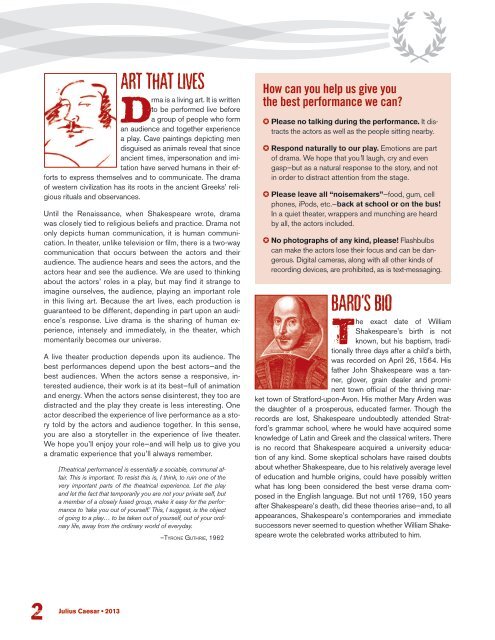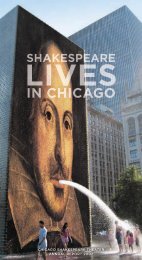Julius Caesar • 2013 - Chicago Shakespeare Theater
Julius Caesar • 2013 - Chicago Shakespeare Theater
Julius Caesar • 2013 - Chicago Shakespeare Theater
Create successful ePaper yourself
Turn your PDF publications into a flip-book with our unique Google optimized e-Paper software.
2<br />
ART THAT LIVES<br />
Drma is a living art. It is written<br />
to be performed live before<br />
a group of people who form<br />
an audience and together experience<br />
a play. Cave paintings depicting men<br />
disguised as animals reveal that since<br />
ancient times, impersonation and imitation<br />
have served humans in their efforts<br />
to express themselves and to communicate. The drama<br />
of western civilization has its roots in the ancient Greeks’ religious<br />
rituals and observances.<br />
Until the Renaissance, when <strong>Shakespeare</strong> wrote, drama<br />
was closely tied to religious beliefs and practice. Drama not<br />
only depicts human communication, it is human communication.<br />
In theater, unlike television or film, there is a two-way<br />
communication that occurs between the actors and their<br />
audience. The audience hears and sees the actors, and the<br />
actors hear and see the audience. We are used to thinking<br />
about the actors’ roles in a play, but may find it strange to<br />
imagine ourselves, the audience, playing an important role<br />
in this living art. Because the art lives, each production is<br />
guaranteed to be different, depending in part upon an audience’s<br />
response. Live drama is the sharing of human experience,<br />
intensely and immediately, in the theater, which<br />
momentarily becomes our universe.<br />
A live theater production depends upon its audience. The<br />
best performances depend upon the best actors—and the<br />
best audiences. When the actors sense a responsive, interested<br />
audience, their work is at its best—full of animation<br />
and energy. When the actors sense disinterest, they too are<br />
distracted and the play they create is less interesting. One<br />
actor described the experience of live performance as a story<br />
told by the actors and audience together. In this sense,<br />
you are also a storyteller in the experience of live theater.<br />
We hope you’ll enjoy your role—and will help us to give you<br />
a dramatic experience that you’ll always remember.<br />
[Theatrical performance] is essentially a sociable, communal affair.<br />
This is important. To resist this is, I think, to ruin one of the<br />
very important parts of the theatrical experience. Let the play<br />
and let the fact that temporarily you are not your private self, but<br />
a member of a closely fused group, make it easy for the performance<br />
to ’take you out of yourself.’ This, I suggest, is the object<br />
of going to a play… to be taken out of yourself, out of your ordinary<br />
life, away from the ordinary world of everyday.<br />
<strong>Julius</strong> <strong>Caesar</strong> <strong>•</strong> <strong>2013</strong><br />
—Tyrone GuThrie, 1962<br />
How can you help us give you<br />
the best performance we can?<br />
✪ Please no talking during the performance It distracts<br />
the actors as well as the people sitting nearby.<br />
✪ Respond naturally to our play Emotions are part<br />
of drama. We hope that you’ll laugh, cry and even<br />
gasp—but as a natural response to the story, and not<br />
in order to distract attention from the stage.<br />
✪ Please leave all “noisemakers”—food, gum, cell<br />
phones, iPods, etc.—back at school or on the bus!<br />
In a quiet theater, wrappers and munching are heard<br />
by all, the actors included.<br />
✪<br />
No photographs of any kind, please! Flashbulbs<br />
can make the actors lose their focus and can be dangerous.<br />
Digital cameras, along with all other kinds of<br />
recording devices, are prohibited, as is text-messaging.<br />
BARD’S BIO<br />
The exact date of William<br />
<strong>Shakespeare</strong>’s birth is not<br />
known, but his baptism, traditionally<br />
three days after a child’s birth,<br />
was recorded on April 26, 1564. His<br />
father John <strong>Shakespeare</strong> was a tanner,<br />
glover, grain dealer and prominent<br />
town official of the thriving market<br />
town of Stratford-upon-Avon. His mother Mary Arden was<br />
the daughter of a prosperous, educated farmer. Though the<br />
records are lost, <strong>Shakespeare</strong> undoubtedly attended Stratford’s<br />
grammar school, where he would have acquired some<br />
knowledge of Latin and Greek and the classical writers. There<br />
is no record that <strong>Shakespeare</strong> acquired a university education<br />
of any kind. Some skeptical scholars have raised doubts<br />
about whether <strong>Shakespeare</strong>, due to his relatively average level<br />
of education and humble origins, could have possibly written<br />
what has long been considered the best verse drama composed<br />
in the English language. But not until 1769, 150 years<br />
after <strong>Shakespeare</strong>’s death, did these theories arise—and, to all<br />
appearances, <strong>Shakespeare</strong>’s contemporaries and immediate<br />
successors never seemed to question whether William <strong>Shakespeare</strong><br />
wrote the celebrated works attributed to him.




